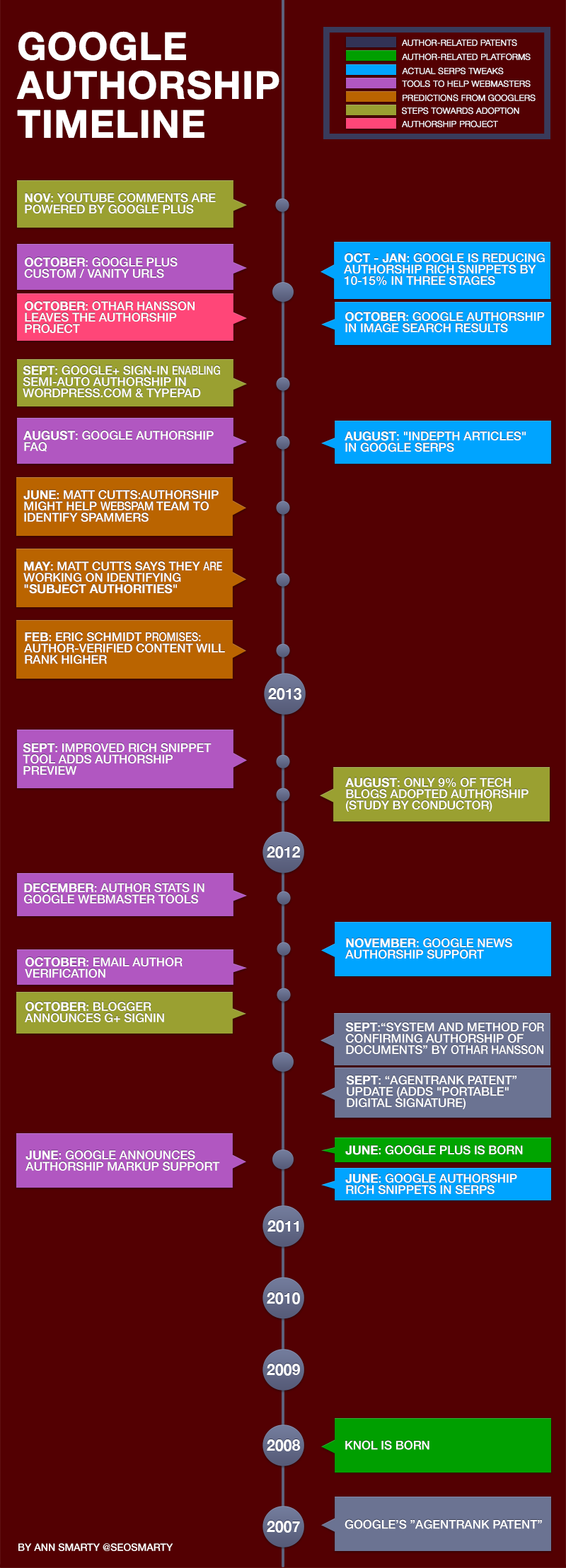Google Authorship has been a hot topic for a couple of years. Where is it heading?
Well, we don’t know that exactly: We do hope Google will find the way to add Authorship as a factor when deciding how trusted and useful the target page is.
Note: In case you don’t know what Google Authorship is, check out my SEOchat thread: “Google Authorship FAQ”
At least we know that Google is serious and the following timeline of Google Authorship events shows that [See more details on each event below]:
Patents
- 2007: Google’s ”AgentRank patent”
- September 2011: (Year of Google Plus birth) UPDATED patent “AgentRank patent” (adds “portable” digital signature)
- September 2011: “System and Method for Confirming Authorship of Documents” by Othar Hansson (updated a couple of times)
Authorship
*2008*
- July 2008: First (failed) Google’s authorship attempt, Knol is born: “The key principle behind Knol is authorship. Every knol will have an author (or group of authors) who put their name behind their content“
*2011*
- June 2011: Authorship markup support is announced.
- June 2011: Two weeks later Authorship search snippets are officially announced. They are supported for the selected authors only and only those who linked their content to profiles.google.com
- June 2011: Google Plus is born. Old profiles.google.com/name URLs are being redirected to plus.google.com/XXXXXXXXX/ making Google Plus the center of authorship program. Google Plus is pushing towards “REAL” identities from day one with their very aggressive “real name” policy. A number of power Google Plus accounts were suspended for using pseudonyms.
- October 2011: Blogger enables easy Google Plus integration (which will later [and I missed that announcement! can you point me to one or did it happen quietly?] verify your authorship IF you choose to connect your Blogger name to your common / real Google Plus name to replace a pseudonym)
- October 2011: To further simplify the authorship process, Google lets you verify your authorship using your email address
- November 2011: Google News blog announces they will now show the journalists in search results if they verify their authorship through Google Plus
- December 2011: Google adds a new section in Webmaster Tools to let authors see their Author stats
*2012*
- January 2012: Google eases their controversial real name policy admitting that some people may want to use pseudonyms for reasons that are none of Google’s business
- August 2012: Authorship is not adopted too fast. A study by Conductor shows only 9% of technology blogs have fully implemented the authorship, rel=author, attribute fully on their site. That is less than 1 out of every 10 blogs.
- September 2012: Google improves Rich Snippets tool enabling you to preview your Authorship result (which does not guarantee it will look the same in actual SERPs but at least it lets you make sure you set everything up correctly)
*2013*
- February 2013: Eric Schmidt promises the future is AuthorRank (i.e. “Within search results, information tied to verified online profiles will be ranked higher than content without such verification“)
- May 2013: Matt says they are working on better identifying “subject authorities”
- June 2013: Matt Cutts says Google Authorship might help the Webspam team to easier identify a spammer
- August 2013: Google Authorship FAQ (Encouraging authors to please verify Google Authorship on content-rich pages versus home page and product pages)
- August 2013*: Google officially introduces “Indepth articles“, another way to reward authors as Authorship markup is required to qualify
- September 2013: An active step towards Authorship adoption: integration of Google+ Sign-In with Google’s Authorship program (now it’s easier to verify authorship of WordPress.com and Typepad blogs; About.com, WikiHow, and Examiner are expected to come next)
- October 2013: Google Authorship is enabled for image search (It’s a bit broken though)
- October 2013: Google Plus allows (more or less) established accounts to claim their custom / vanity URLs. Google Authorship is supported for custom URLs however internally profiles are still interlinked with numeric URLs. It’s not clear which one is recommended.
- October 2013: Google Authorship project may be abandoned with Othar Hansson leaving to the Android search team. It may be not exactly true OR it may mean that authorship is no longer a separate project and will now be tightly integrated into the search department
- October 2013*: Matt Cutts announces Google will be dropping Authorship markup from SERPs by 10-15%. Here’s what happened after that: November: peak in authorship of ~ 24%, then December: drop in authorship of ~20% and finally in January 2014: Authorship is back for many people (which means the overall relative drop was exactly as Matt promised: about 10%)
- November 2013: Youtube comments are now powered by Google Plus (Discussion rank is coming?).
* In both cases, Google hints most relevant and authority authors will be rewarded with additional exposure which prompted the overall feedback “Is it the birth of the Author Rank?”. In reality, it appeared more the case of domain rank (or as we now call it “publisher” rank) with Google still doing the same thing again: rewarding highly-linked trusted domains rather than talented and quality authors.
Last week I also put together a quick deck on how Google Authorship rich snippet has been evolving:
Any Google Authorship events I am missing here?





97 Responses
RT @seosmarty: Google Authorship Timeline: Where It Started and Where It Has Been Heading (Infographic) http://t.co/r7zokprz49
Google Authorship Timeline: From 2008 to 2013 – http://t.co/Q0KH21iqSs #google
Google Authorship Timeline: Where It Started and Where It Has Been Heading (Infographic) http://t.co/PUEy0CNOHZ
RT @seosmarty: Google Authorship Timeline: Where It Started and Where It Has Been Heading (Infographic) http://t.co/r7zokprz49
New @webuildpages: Google Authorship Timeline: From 2008 to 2013 (Infographic) http://t.co/573lsFe7v8
Google Authorship Timeline: From 2008 to 2013 (Infographic): Google Authorship has been a hot topic for a coup… http://t.co/kYS0N0owLe
Google Authorship Timeline: From 2008 to 2013 (Infographic) http://t.co/LnnVARVvYA via @NinjasMarketing
Google Authorship Timeline http://t.co/8sPzX2bVey
Google Authorship Timeline: From 2008 to 2013 (Infographic) http://t.co/U9SGL8gZdI #OnlineMarketing
@NinjasMarketing why are you linking to a URL in your Twitter feed that then redirects to another URL? e.g., /blog/?p=8606
#Google Authorship Timeline 2008-2013 #webdesign http://t.co/2dRRLsdoKg
Google Authorship Timeline: From 2008 to 2013 (Infographic) http://t.co/cj3cpA8dH6 via @NinjasMarketing
Google Authorship Timeline [Infographics] – where is it headed? http://t.co/Mr0LhGMOmz
Kim Kopp Krause Berg liked this on Facebook.
Checked RT @seosmarty: Google Authorship Timeline: Where It Started and Where It Has Been Heading (Infographic) http://t.co/GgWbRdCzUI
‘Google Authorship Timeline: From 2008 to 2013 (Infographic)’ by @NinjasMarketing http://t.co/bo7endRhQP
‘Google Authorship Timeline: From 2008 to 2013 (Infographic)’ by @NinjasMarketing http://t.co/TSAEog1uHA
‘Google Authorship Timeline: From 2008 to 2013 (Infographic)’ by @NinjasMarketing http://t.co/83R7vEN7pC
‘Google Authorship Timeline: From 2008 to 2013 (Infographic)’ by @NinjasMarketing http://t.co/R5a3amf1Fg
‘Google Authorship Timeline: From 2008 to 2013 (Infographic)’ by @NinjasMarketing http://t.co/FLE56fM9gB
‘Google Authorship Timeline: From 2008 to 2013 (Infographic)’ by @NinjasMarketing http://t.co/NY6YjN5Bwf
‘Google Authorship Timeline: From 2008 to 2013 (Infographic)’ by @NinjasMarketing http://t.co/njWrK1GP95
‘Google Authorship Timeline: From 2008 to 2013 (Infographic)’ by @NinjasMarketing http://t.co/9umZba4ztI
‘Google Authorship Timeline: From 2008 to 2013 (Infographic)’ by @NinjasMarketing http://t.co/VhzWulLYJm
RT @DailySEO: ‘Google Authorship Timeline: From 2008 to 2013 (Infographic)’ by @NinjasMarketing http://t.co/Lb75RfTCq1
Google Authorship Timeline: From 2008 to 2013 (Infographic) http://t.co/hxvv6mFiU8 via @ninjasmarketing by @seosmarty
RT @kikolani: Google Authorship Timeline: From 2008 to 2013 (Infographic) http://t.co/hxvv6mFiU8 via @ninjasmarketing by @seosmarty
RT @kikolani: Google Authorship Timeline: From 2008 to 2013 (Infographic) http://t.co/hxvv6mFiU8 via @ninjasmarketing by @seosmarty
RT @kikolani: Google Authorship Timeline: From 2008 to 2013 (Infographic) http://t.co/hxvv6mFiU8 via @ninjasmarketing by @seosmarty
Google Authorship Timeline http://t.co/20sZPAjliO
Google Authorship Timeline http://t.co/pr52wxaydI #google #blogging #marketing
Google Authorship Timeline: From 2008 to 2013 (Infographic) http://t.co/P283Du6zPw
Google Authorship Timeline: From 2008 to 2013 (Infographic) http://t.co/BEzNDaWbdq #harrogateseo
Google Authorship Timeline: From 2008 to 2013 (Infographic) http://t.co/Btj2Hu75M2 #SEO #SEOBEES
Google Authorship Timeline http://t.co/2MbxbZCCfP // handy little Infographic from @seosmarty
‘Google Authorship Timeline: From 2008 to 2013 (Infographic)’ by @NinjasMarketing http://t.co/wHGEQlrYmk
Google Authorship Timeline: From 2008 to 2013 (Infographic) http://t.co/9wZlIgdzBQ #SEO #SEOBEES
RT @seosmarty ‘Google #Authorship Timeline: From 2008 to 2013 (Infographic)’ by @NinjasMarketing http://t.co/duiNmYGKc8 …
Google Authorship Timeline: From 2008 to 2013 (Infographic)’ by @NinjasMarketing http://t.co/xfcwgTDKdK
RT @sexysocial: ‘Google Authorship Timeline: From 2008 to 2013 (Infographic)’ by @NinjasMarketing http://t.co/njWrK1GP95
RT @seosmarty: ‘Google Authorship Timeline: From 2008 to 2013 (Infographic)’ by @NinjasMarketing http://t.co/yDxpNTKwyA
Google Authorship Timeline: From 2008 to 2013 (Infographic) http://t.co/hqttZFI2jf #harrogateseo
Google Authorship Timeline http://t.co/vefeuycWwG RT @seosmarty
RT @ccampb85: Google Authorship Timeline http://t.co/vefeuycWwG RT @seosmarty
RT @seosmarty: ‘Google Authorship Timeline: From 2008 to 2013 (Infographic)’ by @NinjasMarketing http://t.co/yDxpNTKwyA
Google Authorship Timeline http://t.co/RWMZMDoFJk RT @seosmarty
Google Authorship Timeline http://t.co/LxW6RgCpYO RT @seosmarty
RT @the_gman: Google Authorship Timeline http://t.co/LxW6RgCpYO RT @seosmarty
Google Authorship Timeline http://t.co/fpf5i5raeZ RT @seosmarty
Google Authorship Timeline http://t.co/Lmm1PMxpdt
‘Google Authorship Timeline: From 2008 to 2013 (Infographic)’ by @NinjasMarketing http://t.co/bUyNUoZj0u
Google Authorship Timeline http://t.co/evdVAp8OZj RT @seosmarty
Google Authorship Timeline http://t.co/JhXAsTNF93 RT @seosmarty
Google Authorship Timeline http://t.co/HNNtu335Ip RT @seosmarty
Google Authorship Timeline http://t.co/ZgFaVg3x9b RT @seosmarty
Google Authorship Timeline http://t.co/CgWD3LHyqY RT @seosmarty
Google Authorship Timeline: From 2008 to 2013 (Infographic)
http://t.co/yndgAfO2QV
via @seosmarty @NinjasMarketing
Google Authorship Timeline http://t.co/4Oj7cqQMYi
Google Authorship Timeline http://t.co/kGeYEXKxKG RT @seosmarty
RT @tomaltman: Google Authorship Timeline http://t.co/Lmm1PMxpdt
Great infographic: A Timeline of Google Authorship. Where it’s been and where it’s going. http://t.co/3gwcJdnk2k
RT @Threadwatchorg: ‘Google Authorship Timeline: From 2008 to 2013 (Infographic)’ by @NinjasMarketing http://t.co/FLE56fM9gB
Google Authorship Timeline: From 2008 to 2013 (Infographic) http://t.co/7DxA60hBfF from @NinjasMarketing
RT @sun_social: ‘Google Authorship Timeline: From 2008 to 2013 (Infographic)’ by @NinjasMarketing http://t.co/9umZba4ztI
Google Authorship Timeline http://t.co/RuX08gI2Xs RT @seosmarty
Google Authorship Timeline: From 2008 to 2013 (Infographic) http://t.co/H5m4baKd1W
Google Authorship Timeline http://t.co/Sn5bdyCVhq RT @seosmarty
RT @AriousMedia: Google Authorship Timeline: From 2008 to 2013 (Infographic) http://t.co/7DxA60hBfF from @NinjasMarketing
RT @AriousMedia: Google Authorship Timeline: From 2008 to 2013 (Infographic) http://t.co/7DxA60hBfF from @NinjasMarketing
RT @AriousMedia: Google Authorship Timeline: From 2008 to 2013 (Infographic) http://t.co/7DxA60hBfF from @NinjasMarketing
RT @AriousMedia: Google Authorship Timeline: From 2008 to 2013 (Infographic) http://t.co/7DxA60hBfF from @NinjasMarketing
RT @AriousMedia: Google Authorship Timeline: From 2008 to 2013 (Infographic) http://t.co/7DxA60hBfF from @NinjasMarketing
Google Authorship Timeline http://t.co/YesszHdKKU RT @seosmarty
Google Authorship Timeline http://t.co/BFnt3YbPLc RT @seosmarty
Google Authorship Timeline http://t.co/aFOlcJOfNW RT @seosmarty
Google Authorship Timeline: From 2008 to 2013 #Infographic – http://t.co/ZuEgmA54Vs
#Google #Authorship Timeline
Found at http://t.co/Tf5xOGFCTF http://t.co/N11LpPxoiA
#Google #Authorship Timeline
Found at http://t.co/giMnvU46Pw http://t.co/kwgkfZBB5x
Google Authorship Timeline http://t.co/zTHJtNdl4q RT @seosmarty
Look at a BEAUTIFUL Infographic and have some knowledge on Google Authorship Timeline, http://t.co/WlVt9tcepB
Google Authorship Timeline http://t.co/O19dHNVSID RT @seosmarty
Google Authorship Timeline http://t.co/oPbhUReBDb RT @seosmarty
RT @amabaie: Google Authorship Timeline http://t.co/O19dHNVSID RT @seosmarty
RT @richardachapo: Google Authorship Timeline http://t.co/oPbhUReBDb RT @seosmarty
RT @richardachapo: Google Authorship Timeline http://t.co/oPbhUReBDb RT @seosmarty
Google Authorship Timeline http://t.co/nozNC0u2Xy RT @seosmarty
Google Authorship Timeline http://t.co/5cyPe1JRYD RT @seosmarty
Google Authorship Timeline: http://t.co/RfZRJjEIXn
‘Google Authorship Timeline: From 2008 to 2013 (Infographic)’ by @NinjasMarketing http://t.co/yDxpNU2FMI
RT @seosmarty: ‘Google Authorship Timeline: From 2008 to 2013 (Infographic)’ by @NinjasMarketing http://t.co/yDxpNU2FMI
RT @seosmarty: ‘Google Authorship Timeline: From 2008 to 2013 (Infographic)’ by @NinjasMarketing http://t.co/yDxpNU2FMI
RT @seosmarty: ‘Google Authorship Timeline: From 2008 to 2013 (Infographic)’ by @NinjasMarketing http://t.co/yDxpNU2FMI
RT @seosmarty: ‘Google Authorship Timeline: From 2008 to 2013 (Infographic)’ by @NinjasMarketing http://t.co/yDxpNU2FMI
RT @seosmarty: ‘Google Authorship Timeline: From 2008 to 2013 (Infographic)’ by @NinjasMarketing http://t.co/yDxpNU2FMI
RT @seosmarty: ‘Google Authorship Timeline: From 2008 to 2013 (Infographic)’ by @NinjasMarketing http://t.co/yDxpNU2FMI
RT @seosmarty: ‘Google Authorship Timeline: From 2008 to 2013 (Infographic)’ by @NinjasMarketing http://t.co/yDxpNU2FMI
RT @seosmarty: ‘Google Authorship Timeline: From 2008 to 2013 (Infographic)’ by @NinjasMarketing http://t.co/yDxpNU2FMI
Comments are closed.